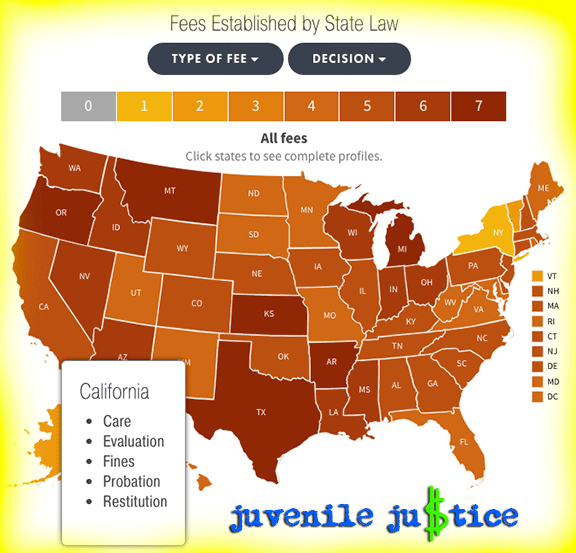A state-by-state analysis by Juvenile Law Center of costs levied against justice-system-involved kids and their families reveals a system that pushes poor families into serious financial strain and debt, and pushes kids further into the justice system.
These costs include court expenses—like witness fees, transportation, cost of prosecution, and cost of court operations—public defender fees (even for indigent defendants), probation supervision costs, money for participation in diversion programs, child support to the state, fees for mental health treatment, health care, and rehabilitative programming, the cost of GPS monitoring, and more. Courts in all states can impose restitution charges on juveniles.
Using JLC’s interactive maps, you can see what fees and fines states impose on kids and their families. (For example, California passes four justice system costs—not including restitution—on to youth and their parents. New York appears to only charge restitution.)
In addition to analyzing state statutes and other data, JLC researchers surveyed 183 people across the nation—most of whom were attorneys and other professionals working with justice-system-involved kids. The surveyed group also included over a dozen family members of kids in the justice system, as well as a handful of former youthful offenders.
Respondents to survey questions from JLC researchers reported that, in a majority of states, when kids fail to pay these fines and fees, they can be locked up in juvie camps and detention centers (and kids already in facilities may be locked up longer), kids’ cases can stay open longer, youth and families face more court visits, are unable to get their records expunged, and face civil judgements. Survey participants told researchers that these high costs often pushed their families into debt.
“Every day, we hear elected officials talking about racial injustice, mass incarceration, and the need for criminal justice reform,” said Jessica Feierman, Associate Director at Juvenile Law Center and report author. “This report identifies one key strategy to address those problems: eliminating or reducing the financial costs of juvenile court involvement on youth and their families.”
In fact, researchers found that these financial penalties actually led to increased recidivism and racial disparities. “Their inability to pay often leads to additional charges, extended probation, or additional punishments, taking them deeper into the justice system,” said criminologists Alex Piquero and Wesley Jennings.
There are several local jurisdictions making welcome changes to bring equity to their juvenile court systems. One of those trailblazing jurisdictions is Alameda County, CA.
Nearly every one of California’s 58 counties charge families for kids’ juvenile justice system involvement. In March, after UC Berkeley researchers revealed the significant burden these fees—which, in Alameda, include GPS monitoring, community supervision, nights in juvenile hall, and more—place on low-income families, Alameda County suspended the fees for its residents. The Berkeley report found that these fees were adding up to an average $2,000 per case, with many totals much higher. One survey respondent reported that many single moms of justice-system-involved kids “have difficulty scraping together $10 to $15 dollars out of their monthly budget to pay on these fees, fines, and costs.”
The report also highlights reform efforts in Washington state, where many of the fees and fines have been eliminated, and judges consider kids’ ability to pay other debts and restitution.
A bill introduced in California by Senator Holly Mitchell (D-Los Angeles) would have eliminated administrative fees for kids locked up or placed on probation statewide, but the bill died in committee.
The JLC report calls for counties and states to stop gouging youth and their families in order to fund their court systems, and urges the prioritization of restitution payments that go straight to victims and are within kids’ ability to pay.

